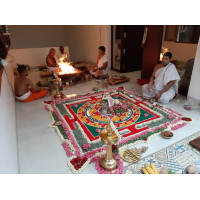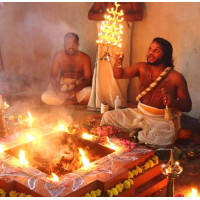Happy Ugadi !
On the auspicious occasion of Ugadi (Telugu New Year Day), what is sacred message for us?
Ugadi is the beginning of a New Year. You have celebrated many Ugadis, but have you given up your bad qualities? Do not limit the celebration of Ugadi to merely putting on new clothes and partaking of delicious food. Today you may wear a new shirt, but how long will it remain new?
Our life is like a newspaper. Once you have finished reading a newspaper, do you like to read the same newspaper again and again?
You have been given this birth, and you have gone through varied experiences of pleasure and pain.
Pray to God to take you across this ocean of life and death, and grant you liberation.
True Ugadi is the day when you give up bad qualities, fill your heart with love, and take to the path of sacrifice. Stop criticizing others.
Respect even those who hate you. Hatred is a bad quality. It will ruin you. Hence get rid of this evil. Love everyone.
Hindu festivals Gudi Padwa and Ugadi will be celebrated in sevral parts of India . This is an auspicious time that welcomes spring.
While Gudi Padwa is a Maharashrian new year and is celebrated in parts of Maharashtra,
Ugadi is the New Year’s Day for the people of Andhra Pradesh and Telangana.
In Karnataka, the festival is celebrated as Yugadi.People celebrate Ugadi and Gudi Padwa by decorating their houses and wearing new clothes.
During Gudi Padwa in Maharashtra people make rangolis on the floor. Down south, people draw colorful patterns on floor called kolamulus.
All Leaders and Gurus will be wishing people on the eve of Chaitra Sukladi, Ugadi, Gudi Padava, Cheti Chand, Navreh and Sajibu Cheiraoba and hoped the festivals would strengthen the bonds of love and affection in the society..
The Lunar New Year’s Day(Ugadi) varies every year as it begins on the first New Moon after the Spring Equinox. It generally falls between March/April of the Gregorian calendar.
The name Ugadi/Yugadi originated from the Sanskrit words; ‘Yuga’(age) and ‘Adi’(starting).
Ugadi celebrates the arrival of the spring season and signifies prosperity.
As spring brings in new leaves, new buds, bright sunlight and nature seem to awaken from its long winter slumber, so does the festival signify the birth of a new era.
According to Hindu mythology, the creator of the world, Lord Brahma, started his creation on this day. Thus, Lord Brahma, is worshipped on this day along with Lord Vishnu, who is the creator of ‘Yugas’(Another name of Lord Vishnu is ‘Yugaadikrit’).
This day is considered very auspicious for starting any new venture or for making new investments.
Preparations for the festival start a week before. Thorough cleaning of the house is done. New clothes are bought for everyone in the family.
On the day of the festival; ladies of the house make a beautiful and colourful ‘rangoli’ at the entrance of the house. A ‘toran’ made of fresh mango leaves, is hung on the doorway to welcome the New year.
After taking a bath and before eating anything, it is considered auspicious to see one’s reflection in a bowl full of melted ghee.
The elderly women of the house, then apply ‘kumkum’ on the foreheads of all family members. The idol of the Lord is given an oil bath and adorned with fresh clothes and garland made of white jasmine flowers.
The entire family gets together to offer prayers.
It is customary to worship the ‘Panchang’ after the prayers are over. An elderly person from the house-hold reads out the ‘Panchang’ for everyone to hear.
The food that is prepared, is first offered to the Lord and later distributed as ‘prasad’ among all.
Bevu Bella is offered to the Lord and then to every member of the family and also to any guest who comes visiting through the day.
Devotees visit the temple in the evening, to take the blessings of the Lord. The priest reads out the ‘Panchang’ for all to hear. This tradition is called ‘Panchanga Sravanam”. It is considered auspicious to hear the ‘Panchang’ read out by a learned priest.
Special traditional dishes are prepared on this auspicious day as an offering (Neivedyam) to the Lord before it is served to the others. Some of the popular dishes are ‘Pulihora’(a tangy, spicy rice dish), ‘Bobbatlu’(Sweet, Bengal gram-coconut filled dumpling), Sweet Pongal, Mango Pachdi, Moong dal Payasam, Kodhimbir vada etc.
One important ritual during the festival is preparing a special dish called the ‘Ugadi Pachadi’ or Bevu Bella. This dish has various flavours, signifying the different experiences one goes through life-
Jaggery(sweet), symbol for happiness; Tamarind(sour), symbol for challenges; Neem flowers(bitter), symbolising the difficulties of life; Raw mango(tangy), symbolising surprises and new challenges that crop up in life; chillis(spicy), symbolises anger; salt(salty)symbolises interesting things in life.
Pala Pazham payasam ….for ugadi….
Moru moru vadai…
Special arusuvai Pachadi..
Each ingredient denotes the six tastes of life:
Sadness – Neem Buds/Flowers for its bitterness.
Happiness – Jaggery and ripe banana pieces for sweetness.
Anger – Green Chilli/Pepper for its hot taste.
Fear – Salt for saltiness.
Disgust – Tamarind Juice for its sourness.
Surprise – Unripened Mango for its tang.
A new year offers you 365 blank pages, write the most beautiful chapter of your life. Be the better version of yourself this new year. Fall, learn, carry on, repeat.
Happy Gudi Padwa& ugadi .
wish you overcome every challenge this new year and climb the ladder of success. Have a successful new year ahead.
Happy Gudi Padwa!
Happy Ugadi
It has been a testing year, but only after complete darkness comes dawn. Your dawn is here. Walk with grace.





